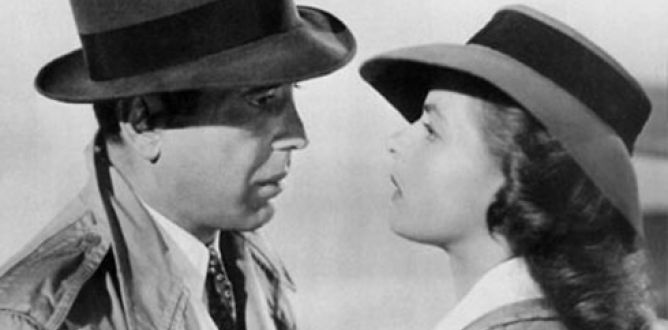Casablanca Parent Guide
Parent Movie Review
During World War II the Vichy Regime was the ruling power in Southern France after the government signed a treaty with the invading German forces. Accordingly, French Morocco was supposed to be a free zone. But in truth, the North African country was subjected to the Nazi sympathies of its European leaders. And this is the setting of Casablanca, which was shot in 1942 during the height of the controversial rule of the French State. While the film’s contemporary audience likely understood the politics of the time, today’s viewers may need to brush up on some history to fully appreciate this classic.
In the movie, Casablanca is a hotbed of illegal activity. The not-so-neutral French held city has become a gathering place for individuals fleeing from encroaching German forces. In this crowded holding pen, people desperate to reach the security of North America attempt to buy exit visas—but these tickets to freedom are pricy.
Amongst those trying to escape is Victor Laszlo (Paul Henreid), whose reputation as an anti-Nazi activist has prompted an elite group of German officers to call on the local French authority. It is Major Heinrich Strasser’s (Conrad Veidt) intention to persuade Captain Louis Renault (Claude Rains) into making sure the political rebel and his beautiful female companion Ilsa Lund (Ingrid Bergman) never leave the dusty desert town.
Aware that a couple of no-questions-asked travel documents have recently been stolen (perhaps with the express purpose of selling them to this high profile fugitive), Captain Renault directs the German deligation to Rick’s Café Americana. The popular nightclub is as well known for its black market deals as its cocktails and hard liquor. Sure enough, Laszlo and his lady friend show up, asking discrete questions about a man recently (and forcibly) arrested in connection with the valuable visas.
But the appearance of the pair of interest has also caught the eye of the establishment’s owner, Rick Blaine (Humphrey Bogart). Although the successful proprietor has never met the Czech underground leader, he is no stranger to the man’s charming escort. Suddenly the tough American, who claims no allegiance to either Axis or Allies, finds himself intrigued. And his obvious curiosity over Ilsa soon has both Strasser and Renault wondering about his possible connection to Laszlo and the liberation cause. It’s a dangerous position for Rick, because he is already suspected of harboring the stolen travel visas.
Considered a piece of film history, this black and white production is one parents may be eager to share with their children. Yet family viewers should be aware that the movie contains some violent depictions, including characters shot on screen. Portrayals of drinking, smoking and gambling are pervasive. And paying corrupt officials with sexual favors, as well as intimate relations between unmarried couples are implied.
Still, Casablanca has enjoyed an immortal status, thanks in part to the famous rendition of As Time Goes By, by the bar’s pianist and singer Sam (Dooley Wilson). Also memorable are the patriotic displays of the characters and the powerful love triangle between Ilsa, Rick and Laszlo. Presenting a moral dilemma that has kept people talking for decades, this wartime tale is sure to inspire a few more generations to say, “Play it again, Sam.”
Directed by Michael Curtiz. Starring Humphrey Bogart, Ingrid Bergman, Claude Rains, Paul Henreid. Running time: 102 minutes. Theatrical release November 26, 1942. Updated July 17, 2017
Casablanca
Rating & Content Info
Why is Casablanca rated PG? Casablanca is rated PG by the MPAA for mild violence (re-rating 1992).
Violence: References are made to murder, theft and black-market activity. Police make forceful arrests. Characters are threatened verbally (torture is alluded to) and with guns, as well as shot (shown on screen). Set in World War II, the script portrays the tensions of encroaching war, conflicting patriotism and invading armies (some newsreel footage shown). Officials are depicted as corrupt. Pick-pocketing and fistfights are seen.
Sexual Content: Sexual relations are implied between unmarried couples. An authority figure accepts sexual favors (discussed but not shown). A woman makes vague sexual invitations to men. A couple kisses.
Language: Mild language and slurs are heard.
Alcohol / Drug Use: Depictions of drinking and smoking are pervasive. A man gets drunk when depressed.
Other: The film portrays gambling and cheating.
Page last updated July 17, 2017
Casablanca Parents' Guide
Why do you think Casablanca has enjoyed an audience over such an extended period? What themes in the story transcend time and setting? Considering the implied corruption and immoral behavior, what positive messages do you feel are portrayed?
How does the script mix humor with its serious plot? How does this effect the way you view the characters and the situation?
Learn more about the Vichy Regime here: http://en.wikipedia.org/wiki/Vichy_France
Home Video
The most recent home video release of Casablanca movie is March 27, 2012. Here are some details…
Home Video Notes: Casablanca: 70th Anniversary Ultimate Collector’s Edition
Release Date: 27 March 2012
Casablanca releases in a 70th Anniversary Ultimate Collector’s Edition on March 27, 2012. The 3-Disc Blu-ray/DVD Set (which is limited and numbered) includes:
- Full size reproduction of the original 1942 film poster
- 62-page production art book
- 4 Collectible Drink Coasters
- Introduction by Lauren Bacall
- Two audio commentaries: - Film critic Roger Ebert & Film historian Rudy Behlmer
- Roster for Warner’s A Night at the Movies viewing mode
- Eight behind-the-scenes documentaries
- Deleted Scenes and Outtakes
- Who Holds Tomorrow?
- Carrotblanca Looney Tunes cartoon
- Scoring the Casablanca stage sessions
- Two vintage Casablanca radio broadcasts
Related home video titles:
Humphrey Bogart can also be seen in The African Queen, playing a similarly hard-shelled, cigar-smoking character. In One Against the Wind another woman fights against German forces by helping Allied soldiers escape from Nazi occupied France.

